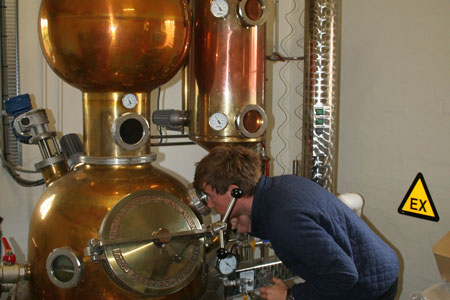Students have developed the first spirit in the world made using ordinary sugar kelp from Danish coastal waters.
Lasse Skovgaard Jensen previously experimented with distilling spirits from elderflower wine. The experiment was a success, which led him to wonder: is it also possible to distil spirits from seaweed?
Together with a childhood friend—currently taking a master’s degree at Aarhus University, School of Business and Social Sciences—he therefore started diving in the waters of the Little Belt to harvest sugar kelp for his new project. This type of seaweed is extremely common throughout the North Atlantic. Over the course of 18 months, the pair succeeded in developing a product they have dubbed ‘Nordic Sake’—whose creation stems from the borderland between conventional craftsmanship and modern biotechnology.
“We think this is the first spirit in the world to come from seaweed,” says Lasse Skovgaard Jensen, before adding:
“As an engineering student, it has been fascinating to have to take into account a great many subjective opinions, such as taste. We have experimented with the tones we particularly wanted to highlight in our product, and with different combinations—in cocktails, for instance—that might complement the taste experience. The cocktail market is actually our principal target group today. In second place, we are looking at restaurants that serve fish and seafood.” Nordic Sake is currently used in cocktails served at the Royal Danish Playhouse.
The seaweed is supplied by Hjarnø Havbrug based on Horsens Fjord. This is what is known as a ‘compensation fish farm’, which cultivates sugar kelp and mussels to offset some of the environmental impact caused by fish farming.
“I’m proud we succeeded in developing a high-value product on the basis of a by-product. In future, we are sure to see many attempts at creating food for human consumption using things that we throw away at the moment. It is a hugely exciting development,” says Lasse Skovgaard Jensen.
”It gave us a real boost when we received a grant from The Foundation for Entrepreneurship – Young Enterprise. DTU Skylab—was also excellent at sparring with us in the fields of business and project development.”

Lasse Skovgaard Jensen producing Nordic Sake using his wood-fired still.
Nordic Sake contains 40 per cent alcohol. This is on a par with the alcohol content of standard schnapps, and significantly higher than the content of Japanese sake, which is made of rice and has an alcohol content similar to fortified wine.
“Seaweed itself doesn’t contain enough carbohydrates for us to achieve 40 per cent alcohol, so we use advanced biotechnology, and add enzymes and extra sugar to reach the desired level. We are also working intensely to refine and develop the fermentation processes. Our long-term vision is to optimize production to a level where we can also produce a bioethanol product based on seaweed that can compete on price with oil,” continues Lasse Skovgaard Jensen.
At the moment, Lasse Skovgaard Jensen is putting the finishing touches to his MSc thesis. When he receives his MSc Eng in Design and Innovation—which he should do shortly—he will immediately turn his full attention back to his distilling apparatus.
Edited article from DYNAMO no. 40, DTU's quarterly magazine in Danish.